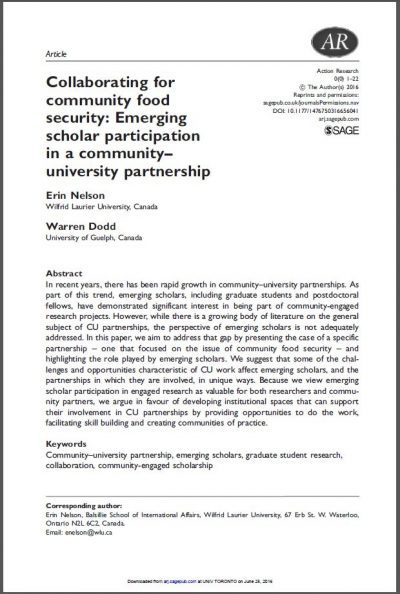In 2013-2014, Community First: Impacts of Community Engagement’s (CFICE) Community Food Security (CFS) Hub supported a project called “Creating a Food Hub Through University-Community Partnership.” This project entailed conducting a developmental evaluation of the collaborative work occurring through Guelph University’s Research Shop on community food security in Guelph-Wellington. The evaluation work supported by CFICE also contributed to further work towards the development of The Seed–a type of community food hub–in Guelph-Wellington (read more on The Seed here).
Erin Nelson, a previous member of The Seed’s Steering Committee, and Warren Dodd, a PhD candidate at University of Guelph, recently co-authored a journal article based on their experiences helping to develop and establish The Seed in Guelph. The article, titled Collaborating for community food security: Emerging scholar participation in a community-university partnership reviews the experiences of “emerging scholars” (including graduate and postdoctoral students) when involved in community-campus partnerships.
Read the full article by clicking on the image below, or browse through the abstract for more information.
Abstract
In recent years, there has been rapid growth in community–university partnerships. As part of this trend, emerging scholars, including graduate students and postdoctoral fellows, have demonstrated significant interest in being part of community-engaged research projects. However, while there is a growing body of literature on the general subject of CU partnerships, the perspective of emerging scholars is not adequately addressed. In this paper, we aim to address that gap by presenting the case of a specific partnership – one that focused on the issue of community food security – and highlighting the role played by emerging scholars. We suggest that some of the challenges and opportunities characteristic of CU work affect emerging scholars, and the partnerships in which they are involved, in unique ways. Because we view emerging scholar participation in engaged research as valuable for both researchers and community partners, we argue in favour of developing institutional spaces that can support their involvement in CU partnerships by providing opportunities to do the work, facilitating skill building and creating communities of practice.
